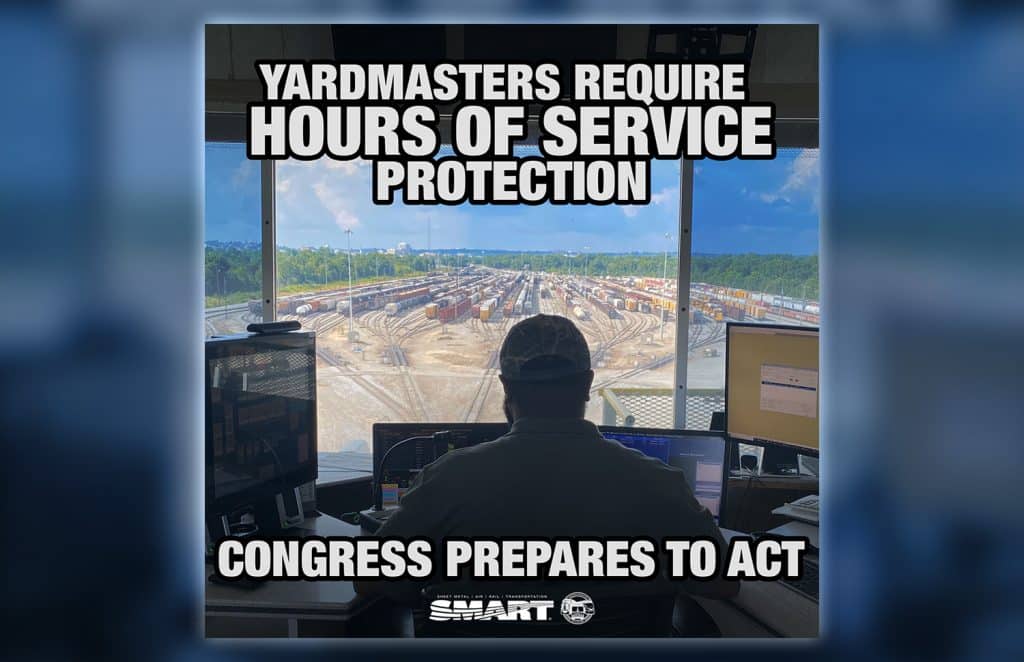
Representatives Salud Carbajal (D-CA) and Mike Lawler (R-NY) introduced bipartisan legislation today that will extend hours of service protection to yardmasters across the nation. The bill, known as the Railroad Yardmaster Protection Act, which SMART-TD endorses, brings yardmaster hours in line with those of other rail employees.
The Federal bill follows our success earlier this year in Minnesota, where a similar SMART-TD championed bill was signed into law by Governor and Vice-Presidential candidate Tim Walz. The role our nation’s yardmasters play is now known at the highest levels of government.
“Yardmasters serve a critical role in our nation’s railroad network,” Congressman Carbajal explains on his website, where he and Congressman Lawler announced the bill. “They oversee the operations of a rail yard and manage the duties of various rail workers. They not only direct the activities of their fellow workers but also [direct] passenger and freight trains when they arrive and depart. But currently, there are no limitations to the number of hours a yardmaster can [be required to] work in a day, week, or month. This is not only dangerous for the well-being of the yardmasters but the safety of workers on the yard and train passengers.” Our support for this bill reinforces our commitment to the safety and well-being of all SMART-TD members.
Read Congressman Carbajal’s Press Release ►
“Yardmasters are one of the most overlooked crafts in the railroad industry,” said Chris Bartz, SMART-TD alternate vice president and an active yardmaster himself. “They are responsible for all train movements and activity within a rail yard. The Yardmaster coordinates and supervises many work groups, including dispatchers, Maintenance of Way, supervisors, customer service, and the general public.
“Many Yardmasters are responsible for the safe operation of multiple train yards simultaneously. Some positions manage five train yards simultaneously. Railroad Officers expect the Yardmasters to execute their duties with perfection. The workload and demands of the position cause the work environment to be continuously stressful.
“Yardmasters work 8-hour shifts but can be forced to work 16 consecutive hours if no relief is available. They can work 7 days a week, 365 days a year, without a mandated day off.
“It is deplete of reason that the Train Service employees are covered under hours of service laws that mandate rest periods, while the Yardmasters that supervise these employees can work extended hours and weeks on end.
“This legislation is desperately needed to improve the safety of our membership, and also the well-being of those working in all railyards and the general public.
“I am grateful to Representatives Carbajal and Lawler for having the foresight to see the necessity of introducing this critically important legislation.”
We extend our deepest appreciation to Reps. Carbajal and Lawler for their leadership and dedication to our cause. SMART-TD and our Legislative Department will continue to secure additional co-sponsors for this bill, uniting legislators who share our belief that the safety of transportation workers transcends any political affiliation. Together, we will continue to champion the rights and protections that Yardmasters and all rail workers deserve.
Related News
- New Jersey Train Length, Crew Size Law Awaits Governor’s Signature
- CSX Conductor, Single Mother Devastated in Head-on Collision
- GP Coleman’s 2025 holiday message to members
- SOFA Safety Alert
- AJFL Scholarship Application Opens Soon
- SMART-TD Applauds FRA and DOT for Strengthening Cross-Border Rail Safety Protections
- Michigan sheet metal worker details impact of canceled project
- Regional Training Seminars coming to St. Paul, Baltimore in 2026
- SMART leaders train to bargain better contracts in Atlanta
- Chicago-area SMART members win big with transit funding bill